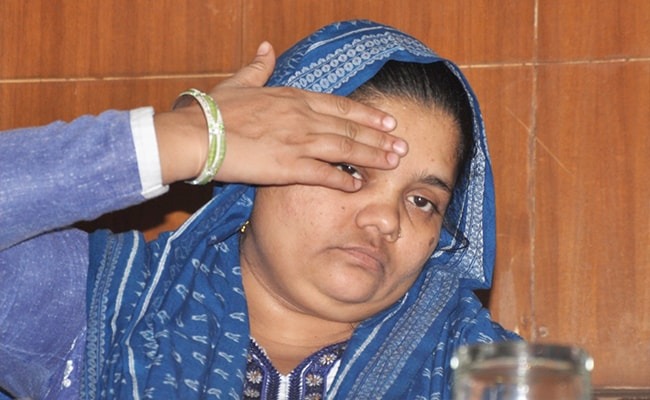Eleven men freed early after being found guilty of gang raping a pregnant Muslim woman must be returned to prison, India’s Supreme Court has said.
Part of a Hindu mob, the men were serving life terms for the attack on Bilkis Bano, as well as the murder of 14 of her family members, during anti-Muslim riots in Gujarat state in 2002.
However, they were released in August 2022 by order of Gujarat’s government.
The order, and the celebrations as they left prison, caused global outrage.
The article contains details that some readers may find disturbing
Ms Bano told the Supreme Court in a petition that the release of the men had “shaken the conscience of the society”.
Calling it “one of the most gruesome crimes this country has ever seen”, she said the release had left her “shell-shocked and completely numb”.
The two-judge Supreme Court bench, headed by Justice BV Nagarathna, said the state of Gujarat was “not competent” to pass the remission order in the case since the men had been tried and convicted in a court in the neighbouring state of Maharashtra.
The bench added that since the government’s remission order had been nullified, the 11 convicts must return to prison within two weeks.
“Justice encompasses not just the rights of the convicts but also the rights of the victims” and the “primary duty” of the court is to uphold justice and rule of law, Justice Nagarathna said, adding that the “rule of law must be preserved unmindful of the ripples of the consequences”.
The landmark judgement is expected to create ripples, especially in Gujarat where Prime Minister Narendra Modi was chief minister at the time of the riots and was criticised for not doing enough to prevent the carnage.
He has always denied wrongdoing and has not apologised for what happened in the riots.
Gujarat state supported the release of the men sentenced for attacking Bilkis Bano and her family.
Officials said in court that the men – first convicted by a trial court in 2008 – had spent more than 14 years in jail and were released after factors such as their age and good behaviour in prison were taken into consideration.
The state government said it had sought the federal government’s approval – which was granted by the home ministry, led by Mr Modi’s close aide Amit Shah.
When the men were freed in 2022 they were given a heroes’ welcome as they stepped outside the jail in Godhra, with relatives giving them sweets and touching their feet to show respect.
Federal prosecutors had said they should not be “released prematurely and no leniency may be shown” to them as their crime was “heinous, grave and serious”.
Days after her attackers were freed, Bilkis Bano said the decision to release them had “shaken her faith in justice”.
“How can justice for any woman end like this? I trusted the highest courts in our land.
I trusted the system, and I was learning slowly to live with my trauma,” she wrote, appealing to the Gujarat government to “undo this harm”.
The attack on Ms Bano and her family was one of the most horrific crimes during the riots, which began after 60 Hindu pilgrims died in a fire on a passenger train in the town of Godhra.
Blaming Muslims for starting the fire, Hindu mobs attacked Muslim neighbourhoods.
Over three days, more than 1,000 people died, most of them Muslims.
The morning after the train fire, Ms Bano – then 19 and pregnant with her second child – was visiting her parents in a village called Randhikpur near Godhra with her three-year-old daughter.
When rioters attacked the village and started setting Muslim homes on fire, she and 16 relatives went on the run, she told the BBC in 2017.
Over the next few days, they sought shelter in mosques or subsisting on the kindness of Hindu neighbours.
On the morning of 3 March 2002, a group of men attacked them “with swords and sticks”.
“One of them snatched my daughter from my lap and threw her on the ground, bashing her head into a rock.”
Her attackers were her neighbours, men she had seen almost daily while growing up.
They tore off her clothes and several of them raped her, ignoring her pleas for mercy.
Her cousin, who had given birth two days earlier, was raped and murdered and her newborn baby was killed too.
Bilkis Bano survived because she lost consciousness and her attackers left, believing she was dead.
Two boys – seven and four – were the only other survivors of the massacre.
Her fight for justice has been long and nightmarish.
It has been well documented that some police and state officials tried to intimidate her, evidence was destroyed and the dead were buried without post-mortem exams. The doctors who examined her said she hadn’t been raped, and she received death threats.
The first arrests in the case were made only in 2004 after India’s Supreme Court handed over the case to federal investigators and transferred her case to Mumbai saying that courts in Gujarat could not deliver justice to her.
Over the years, the courts have convicted dozens of people for involvement in the riots, but some high-profile accused won bail or were exonerated by higher courts.
This included Maya Kodnani, an ex-minister in Mr Modi’s Gujarat cabinet, whom a trial court had called “a kingpin of the riots” that took place in one area.
In 2013, a Supreme Court panel ruled there was insufficient evidence to prosecute Mr Modi, who became prime minister the following year. But critics have continued to blame him for the riots happening on his watch.
BBC









